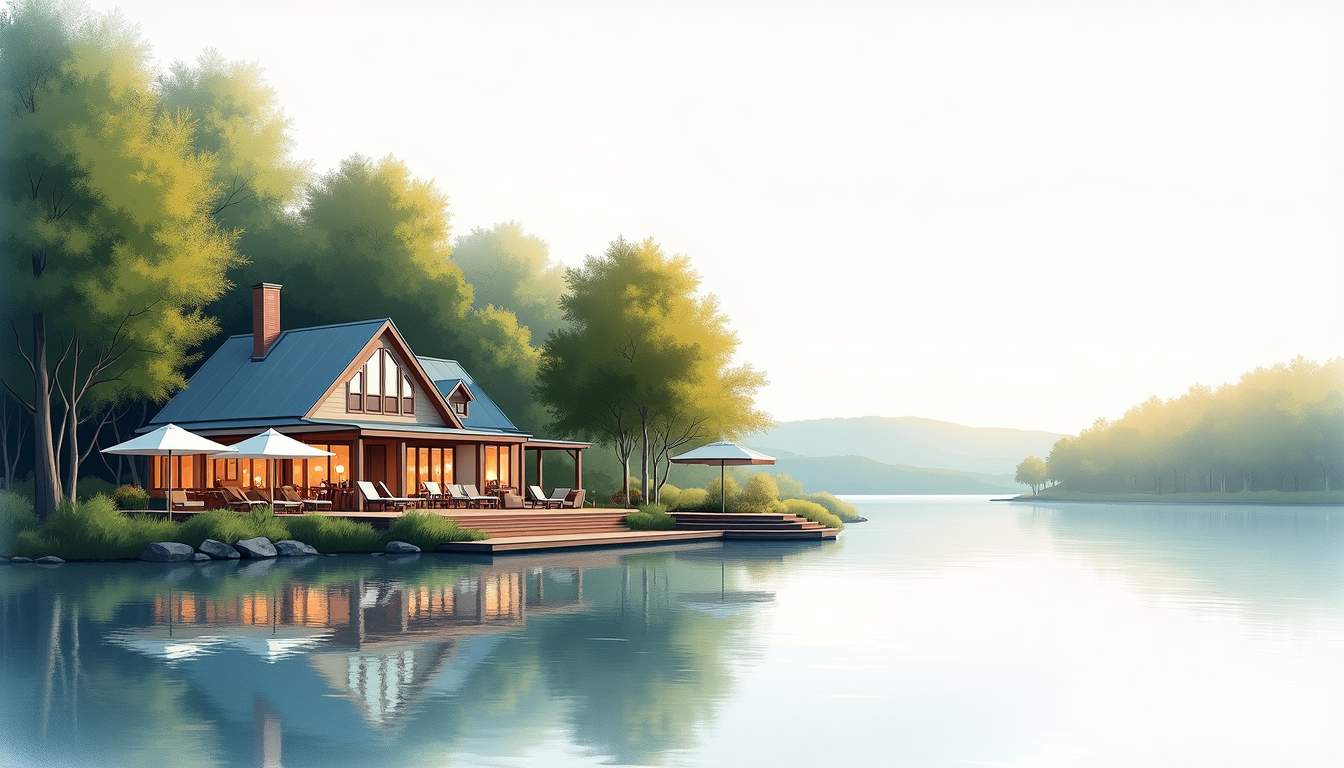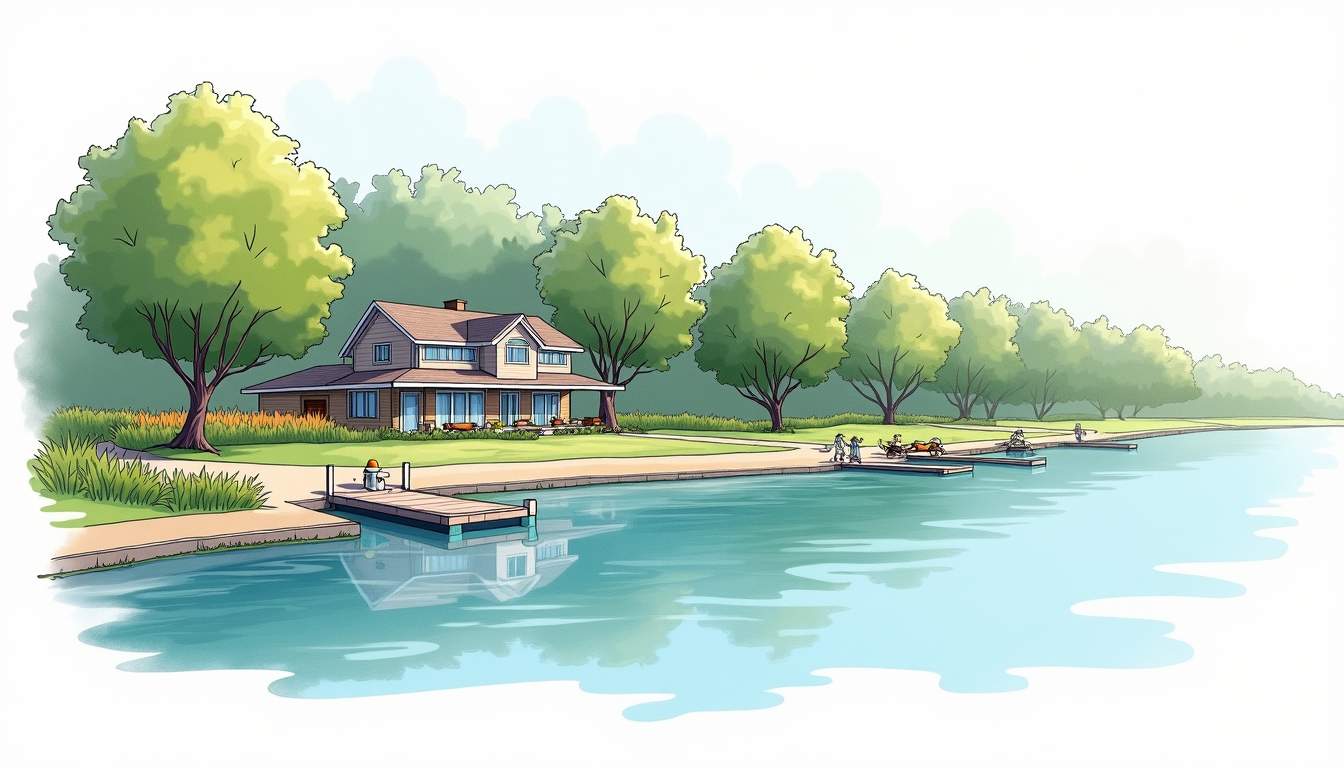
Buying a private lake home that allows event access—weddings, corporate retreats, family reunions—blends the appeal of waterfront living with investment and lifestyle considerations. Such properties offer unique advantages but also require careful due diligence. This guide explains the essential facts buyers should weigh before making an offer, from legal and zoning issues to insurance, neighborhood dynamics, and revenue potential.
Not all lake properties are created equal when it comes to ownership and access. Knowing the difference between riparian rights, private lake ownership, and community-owned lakes is the first step. Those rights determine whether a property owner can build docks, regulate boat traffic, or control access to the shoreline.

Riparian rights typically apply when a property borders a public waterway and grant reasonable use of the water, but they rarely confer exclusive control. In contrast, a lake completely owned by a property owner or association can be managed for private use, including restricting event attendees or setting hours. Buyers should obtain a clear title review and a survey showing the exact boundaries of water and shore ownership.
Shared access through a homeowners association or easement can limit event plans. Covenants may restrict the number of attendees, the use of amplified sound, or the types of boats permitted. Exclusive access provides more flexibility, but might come with higher maintenance responsibilities and legal obligations to maintain safe conditions on the water.
Even with private ownership, organizing events often requires local permits. Noise ordinances, parking restrictions, septic capacity limits, and temporary structure permits can all affect feasibility. Reviewing municipal codes and consulting with the local planning department before purchase avoids surprises later.
Zoning laws influence whether an owner can legally host events at a private residence. Residential zoning might allow occasional private gatherings but prohibit regular commercial activity. If the property is currently used for events, confirm whether that use was grandfathered or permitted through special use permits.

Environmental regulations are particularly significant around lakes. Wetland setbacks, shoreline protection rules, and stormwater runoff requirements can limit landscaping, dock expansion, or parking lot construction. Federal and state environmental protections may also apply when a lake is part of a larger watershed.
A property currently hosting events without proper permits may be considered a legal nonconforming use. Buyers should determine whether the use can continue, be expanded, or must cease after a sale. Consult an attorney to review any conditional use permits, variances, or enforcement actions connected to the property.
Some lakeside properties are subject to conservation easements intended to protect shoreline vegetation or restrict development. These easements can preserve natural beauty and biodiversity but also limit the ability to install lighting, build staging, or create extensive parking. Request full documentation and understand the implications for event operations.
Hosting events at a private lake home introduces elevated liability risks: slips and falls, water rescues, parking accidents, and alcohol-related incidents. Standard homeowner policies may not cover event-related claims, so buyers should consult insurance professionals about specialized coverage.
General liability, liquor liability, and event-specific policies can be required or recommended depending on the scale of activity. Pay close attention to coverage limits, exclusions for watercraft or swimming activities, and whether the insurer requires safety measures such as lifeguards, fencing, or clearly posted rules.
Effective risk management reduces premiums and protects the property owner. Strategies include posting water safety rules, providing life jackets, designating supervised swim areas, hiring event staff trained in emergency response, and arranging for off-site parking with shuttles. Documenting safety measures and contractor vetting procedures also strengthens an insurer’s willingness to provide coverage.
Contracts with event hosts or rental clients should include indemnity clauses that require the renter to assume responsibility for injuries or damages caused by their actions. Hold harmless agreements shift some liability away from the homeowner but do not eliminate the need for robust insurance.
A successful event requires more than a scenic shoreline. Adequate access for guests, vendors, and emergency vehicles is essential. Narrow driveways, private roads, and limited turnaround areas can complicate logistics and increase liability. Confirm whether the property has legal access rights and whether the road is maintained by the municipality or privately by owners.

Parking can be a limiting factor. On-site parking may be prohibited by setbacks or soft soils that cannot support vehicles. Off-site parking agreements with neighbors or the use of shuttle services are common solutions. Inspect the septic system’s capacity—high guest counts may overwhelm systems not designed for frequent large gatherings, triggering health department restrictions.
Events often require temporary power for lighting, catering, and sound equipment. Verify electrical capacity and the feasibility of installing temporary generators or additional wiring. Lighting considerations include minimizing glare toward neighbors and wetlands while providing safe pathways for guests. Plan for trash and recycling collection; many locales require licensed haulers for event waste.
Proximity to emergency services matters. Remote lake homes may have extended response times for EMS or fire departments. Determine whether roads are passable year-round and whether the local fire authority has jurisdictional access. Some communities require a fire safety plan or fire watch when hosting larger events.
The relationship with neighbors can make or break the event-hosting experience. Lakeside communities often cherish quiet and wildlife, and neighbors may object to frequent or loud gatherings. Review HOA rules and speak with immediate neighbors about any history of complaints or support for events.
Community sentiment also affects resale value. A home with a reputation for disruptive events may be harder to sell or may fetch a discount. Alternatively, properties that balance hosting with neighborly practices often become desirable for buyers who want versatile use without conflict.
Noise impacts go beyond human neighbors. Loud music and lighting can disturb wildlife and violate conservation rules. Excessive boat traffic or wake can cause shoreline erosion. Mitigation measures—curfews, restricted boat zones, and sound-dampening strategies—help preserve good relations and environmental health.
Hosting occasional community-focused events like fundraisers or conservation seminars can build goodwill. Partnerships with local vendors, caterers, and shuttle providers create reliable support networks and can open opportunities for negotiated services and discounts. These partnerships help professionalize event operations and reduce friction with neighbors.
A private lake home that permits events can generate additional income, offsetting ownership costs. Income potential depends on location, seasonality, local demand for event venues, and the property’s amenities. A lakeside wedding venue in a popular tourist region can command premium rates, while remote areas may see limited marketability.
Budget for recurring costs beyond mortgage and utilities: higher insurance premiums, additional maintenance, waste disposal, and repair of wear and tear from events. If planning to run a venue professionally, factor in licensing fees, marketing, staffing, and accounting or booking platform expenses.
Properties successfully used as event venues may have enhanced commercial value but could also be classified differently for taxation purposes. Assess how local tax authorities treat occasional rental income versus a commercial operation, and seek a valuation that considers both residential and potential commercial uses.
Clear contracts protect both owner and client. Standard terms include nonrefundable deposits, damage deposits, cancellation policies, capacity limits, noise curfews, and vendor requirements (such as liability insurance and certification). These policies reduce the likelihood of disputes and help preserve the home's condition.
Inspect the shoreline for erosion, invasive species, and riparian vegetation. Dock condition, underwater hazards, and water quality are critical both for safety and for preserving property value. Hire specialists for a shoreline assessment, and consider an ecological management plan that balances recreation with conservation.
Maintenance responsibilities for private lakes or shared amenities can be substantial. Dredging, weed harvesting, dock repairs, and shoreline stabilization require ongoing funding. Request historical maintenance records and budgets for the lake and any shared facilities before buying.
Seasonal weather affects accessibility and maintenance. Freeze-thaw cycles can damage docks and septic systems; fluctuating water levels may expose or inundate shoreline features. Winterization procedures for plumbing, boats, and outdoor equipment are necessary to avoid costly repairs.
Professional property or venue management reduces owner workload. Managers handle bookings, vendor coordination, groundskeeping, and compliance with regulations. Although this service is an additional cost, it often improves guest experience and preserves the home’s condition over time.
A comprehensive due diligence checklist ensures informed decision-making. Items to verify include clear title and recorded easements, zoning compliance, insurance quotes, septic and well inspections, environmental reports, and copies of any association rules. A site visit during a planned event—if possible—offers valuable perspective on logistics and neighborhood impact.
Engage a multidisciplinary team: a real estate attorney familiar with waterfront and event use, a licensed inspector experienced in shoreline properties, an insurance broker, and a local land planner. This team helps translate the property’s promise into a realistic budget and operational plan, protecting both lifestyle goals and financial investment.
When proceeding, consider conditional offers tied to permit approvals, satisfactory insurance terms, and verification that any advertised event use complies with local law. Conditional clauses preserve negotiating leverage and prevent costly surprises after closing.
Owning a private lake home with event access can deliver unforgettable experiences and financial upside, but it also brings regulatory, insurance, and operational complexities. A careful, well-documented approach allows buyers to enjoy the benefits while minimizing risks, ensuring the property remains an asset for years to come.
Ready to embrace luxury waterfront living with the perfect blend of privacy and event-friendly amenities? Tennessee National offers exclusive private lake homes within a gated community featuring top-tier facilities, including a private marina and scenic nature trails. Whether you seek a move-in ready residence or a custom build, our resort-style lifestyle provides the ideal setting for both relaxation and memorable gatherings. Schedule a Private Tour today and start making unforgettable memories at Tennessee National.